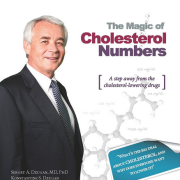The Trouble With Statins
A good example of the failure of drugs to effectively and safely treat a serious medical condition is statins. Statins are a class of drugs used to treat hypercholesterolemia—high cholesterol. As of 2008, statins were the best‐selling prescription drugs in the world, with $20 billion sold per year in the United States alone. Although many studies show that statins provide primary prevention, the long‐term tolerability of these drugs is highly questionable. Statins can reduce total cholesterol in the blood and thus help decrease the incidence of coronary heart disease, but the use of statins is also associated with muscle pain and weakness, dizziness, cognitive impairment, peripheral neuropathy, and an increased risk of noncardiovascular death.
For example, when we review the results of major primary prevention trials, we find that the 15 percent decrease in deaths from heart disease in patients who were using cholesterol‐lowering drugs (CLD) is offset by increases in deaths from other conditions. One area of concern is cancer: Two popular classes of CLDs—fibrates and statins—cause cancer and liver damage in rodents. A significant increase in cancer incidence, especially gastrointestinal cancer, has been seen in people who take CLDs. Use of CLDs also increases cancer at the expense of decreasing deaths from cardiovascular conditions, especially among the elderly and people who are being treated with immunotherapy for cancer. There is also evidence of a relationship between cancer and statin dosing. Yet another area of concern is stroke. Low or reduced levels of serum cholesterol have been shown to increase the risk of death from hemorrhagic stroke.
Impact of Drugs on Hormones
Although we have not yet fully explained the major role hormones play in restorative medicine, here we want to point out the potentially devastating impact the use of drugs can have on hormone levels and balance in the human body. Studies show that cholesterol‐lowering drugs, for example, can cause hormone level abnormalities. Some research indicates that statin use disturbs testosterone levels, while specific drugs seem to target certain hormones. The statin, mevastatin, for example, can significantly decrease the production of progesterone and testosterone, while clofibrate has a similar effect on testosterone and cortisol.
At an even more basic level, the use of synthetic hormones, rather than bioidentical hormones, can disrupt the body’s natural hormone balance. The human body contains all the elements it needs to process natural hormones when they occur in their natural proportions. When you introduce synthetic hormones, the human body does not metabolize them in the same way it does bioidentical hormones. That’s because synthetic hormones are not hormones; like drugs, they are foreign substances.
The Trouble with Cholesterol‐Lowering Drugs
- The range of side effects caused by CLDs ranges from 4 to 38 percent in many studies, but has been seen to rise as high as nearly 75 percent in some trials (especially for cerivastatin and pravastatin).
- Most patients who begin cholesterol‐lowering therapy stop it within one year: studies show 60 percent of patients discontinued their medication over 12 months, and only about 33 percent of patients ever reach their treatment goals.
- The most common side effects of CLDs are abdominal pain, chest pain, dizziness, asthenia/fatigue, fibromyalgia, headache, insomnia, elevated transaminase levels in the liver, upper respiratory tract infection; also eczema, rashes, cramps, exercise intolerance, severe rhabdomyolysis, renal failure, and poor quality of life.
- Statins deplete coenzyme Q10, a substance that is important for heart health. Supplementation with CoQ10 should be pursued to offset the dangers of statin drugs to the heart.
- Statins may impair heart pumping function due to their myopathic effects.
- Other conditions that may occur as a result of taking statins include erectile dysfunction, dementia, memory loss, severe irritability, peripheral neuropathy, restlessness, lupus‐like syndrome, pleurisy, arthralgia, tachyphylaxis, and mental confusion.
Get your FREE e-Book today, Dr. Dzugan’s “Your Blood Doesn’t Lie” and learn more about our program and how it can help you.
Because every person’s body chemistry is different, we work closely with you to develop a personalized program that improves your overall Quality of Life.
Scroll to the bottom of the Dzugan PhysioLogic home page and grab your free ebook, a free consultation with one of our Doctors, or just give us a call at 1-866-225-4877 Option 2 today to speak with an experienced advisor.
DISCLAIMER: This blog is for informational purposes only. It does not replace medical care from a licensed physician. If you have a medical concern, please contact DzLogic at 1-866-225-4877.



